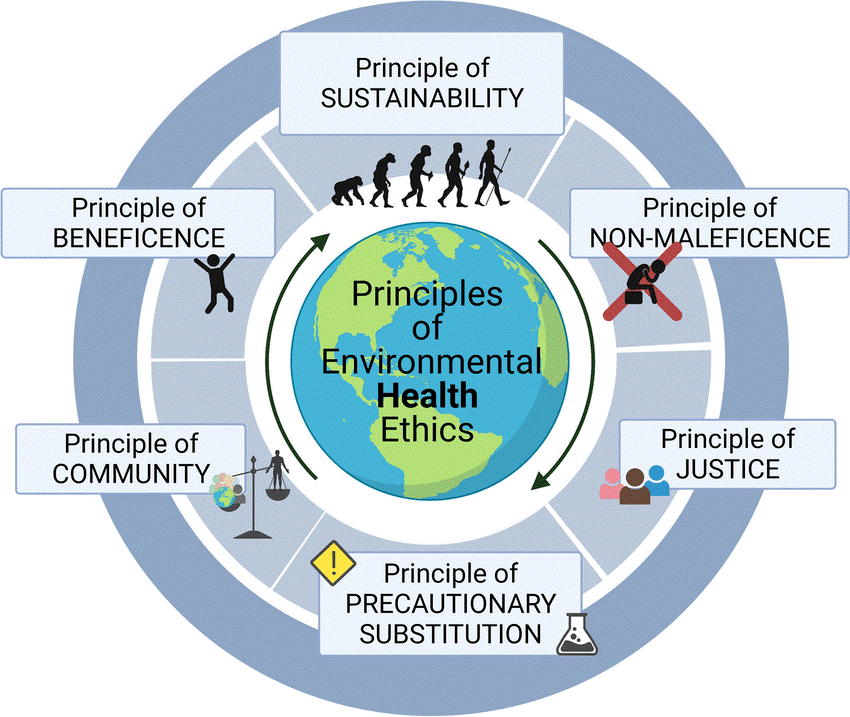- Home
- Prelims
- Mains
- Current Affairs
- Study Materials
- Test Series
 EDITORIALS & ARTICLES
EDITORIALS & ARTICLES
Environmental Ethics in Indian Philosophy: A Sacred Duty of Consciousnes
Environmental Ethics in Indian thought transcends utilitarian views of nature. It perceives the Earth not as a resource, but as an extension of consciousness—where caring for the planet is a sacred duty (Dharma), and ecological stewardship is spiritual evolution.
Foundational Features of Indian Environmental Ethics
- Holistic Worldview: Pancha Mahabhutas and Planetary Balance - The five great elements—earth (Prithvi), water (Apas), fire (Agni), air (Vayu), and space (Akasha)—form the basis of both human health and ecological harmony. Disruption in one reflects imbalance in the other.
- Moral Stewardship: Self-Care Through Nature-Care - Indian philosophy teaches that harming nature is equivalent to harming oneself. Soil, water, and air are not inert substances but living entities that sustain our physical and spiritual well-being.
- Ahimsa and Interdependence - Non-violence (Ahimsa) extends beyond humans to all beings and elements. Every creature, plant, and microbe is worthy of respect, forming a web of interdependence.
- Spiritual Ecology: Psychological and Ecological Unity - Environmental degradation is not just physical—it signals a rupture in our inner consciousness. Healing nature is thus a path to healing the self.
- Sustainability as Spiritual Practice - Traditional practices like rainwater harvesting, seasonal cropping, and sacred groves emerged from spiritual reverence, not economic necessity. Sustainability was embedded in ritual and lifestyle.
 Indian Philosophical Traditions on Ecology
Indian Philosophical Traditions on Ecology
- Vedic and Upanishadic Thought - The Vedas envision the cosmos as a sacred organism. The hymn “Mata Bhumih Putro Aham Prithivyah” (Earth is my mother, I am her child) encapsulates ecological kinship. Humans, gods, and nature form a moral continuum.
- Ayurveda: Health Through Environmental Purity - Ayurveda links disturbed doshas (bodily energies) to polluted ecosystems. Bhoomi Devi (Mother Earth), water, and air are sacred entities whose purity ensures both physical and spiritual health.
- Jainism: Ahimsa and Aparigraha as Ecological Ethics - Jainism extends consciousness to earth, air, and water. Practicing non-possession (Aparigraha) and non-violence (Ahimsa) fosters restraint and reverence for all life forms.
- Buddhism: Interdependence and Compassion - Through Pratītyasamutpāda (dependent origination), Buddhism teaches that all beings arise in mutual interdependence. Compassion (Karuna) becomes ecological mindfulness in action.
- Sikhism: Nature as Divine Teacher - Guru Nanak’s verse “Pavan Guru, Pani Pita, Mata Dharat Mahat” sanctifies air, water, and earth as spiritual guides. Environmental care is an act of devotion (Seva).
Comparative Glance: Western Environmental Philosophies
- Deep Ecology (Arne Næss) - Advocates intrinsic value of all life forms. Calls for a shift from anthropocentrism to ecocentrism. Influences include Norway’s wilderness policies and global rewilding efforts.
- Utilitarian Environmentalism (John Stuart Mill) - Focuses on maximizing human welfare. While pragmatic, it risks reducing nature to economic utility. Seen in cost-benefit climate policies and renewable energy subsidies.
- Ecofeminism (Vandana Shiva, Val Plumwood) - Links ecological exploitation with gender oppression. Promotes nurturing, empathy, and cooperative coexistence as ethical responses to both.
Challenges to Indian Environmental Ethics
- Commodification of Spirituality - Sacred principles like Ahimsa and Dharma are being reduced to marketable eco-labels, diluting their moral essence.
- Urban Alienation - Modern lifestyles disconnect individuals from nature’s rhythms, creating apathy and spiritual voids that weaken ecological empathy.
- Policy–Practice Gap - Environmental laws often measure compliance in numbers, not conscience. Without moral education, governance lacks soul.
- Cultural Dilution - Pollution through plastics and chemicals contradicts Vedic purity codes. Rituals lose authenticity when divorced from ecological discipline.
- Climate Modernity Dilemma - India faces a tension between material progress and ecological restraint. True modernity lies in harmonizing prosperity with Prakriti (Nature), not dominating it.
The Road Ahead: Reviving Ecological Dharma
- Integrate Ethics into Education - Embed Vedic ecology, Panchabhuta harmony, and Ahimsa ethics into NEP 2020. Cultivate ecological conscience from childhood.
- Policy Fusion: Science Meets Spirituality - Link Ayurveda’s balance principles with missions like Jal Jeevan, Namami Gange, and PM-PRANAM. Let compassion guide compliance.
- Community Stewardship - Empower temples, panchayats, and faith-based trusts to protect rivers, forests, and sacred groves. Decentralize ethics through Seva.
- Modern Technology for Ancient Wisdom - Use AI, GIS, and satellite mapping to safeguard sacred sites and traditional water systems. Innovation must serve Sanatan values.
- Global Advocacy - Present India’s Ecological Dharma at COP-30 and UNESCO as a civilizational ethic of restraint and reverence. Environmental ethics is not policy—it’s destiny.
Prakriti and Atman—One Consciousness
Indian philosophy teaches that Nature (Prakriti) and Self (Atman) are reflections of the same consciousness. Restoring this unity transforms environmental protection into spiritual evolution. By aligning water, soil, and spirit, India can lead the world toward a compassionate, sustainable future.









 Latest News
Latest News General Studies
General Studies